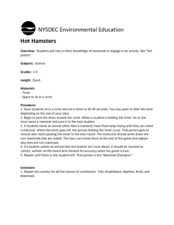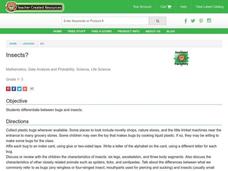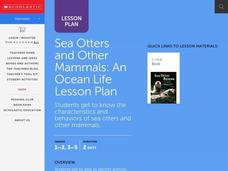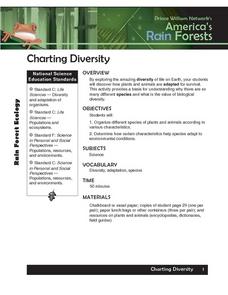Curated OER
Charlotte and Her Relatives Visit the Classroom: Spider Activities, Experiments and Projects
Students compare and contrast different spider species that they capture and maintain in the classroom for several days. They identify and research the species characteristics and living requirements then conduct an experiment on spider...
Curated OER
Mammal Teeth and Skulls-Adaptations and Identification
Student study the differentiation of teeth and skull adaptations in mammals in general and 14 common terrestrial mammals. They explore more about these mammals, their natural history, their adaptations and their identification through an...
Curated OER
Land Environments
In this land environments worksheet, students will complete a table by filling in the climate, dominant plants, and characteristic animals for 6 different habitats.
Curated OER
Arthropods at Home- Spider, Isopod, or Any Arthropod
Students design a habitat for an arthropod. In this organisms lesson, students read the book, A House is a House For Me. Students find an arthropod and create a terrarium.
Curated OER
Caring for a Pet
Students identify the responsibilities of pet owners. In this animal welfare lesson, students read the book Animals As Friends and list the characteristics of a good pet owner. Students use a tally sheet to determine what pets students...
Curated OER
Comparing Sea Horses and Knights
Students investigate sea horses and knights. In this marine biology lesson, students read the book How to Hide an Octopus and discuss the purpose of camoflage. Students research knights and sea horses and record their research on...
Curated OER
Learning About Birds
Students investigate the lives of birds by writing about their favorite species. In this animal life lesson, students research a science book and web to discover the characteristics of many types of birds. Students select one...
Curated OER
Species Diversity in Ecosystems with Different Techniques of Land Management
Learners visit numerous places to help in their understanding of Ecology. In this biology lesson plan, students will learn about characteristics and how to identify numerous plants and animals. This lesson allows for many field trip...
Curated OER
Alien Outlook
Students discuss the characteristics that make animals and or people unique. They discuss what characteristics could they combine to make a truly unusual creature, such as an alien or fantasy animal. Students choose at least one point of...
Curated OER
Growing Up (And Around, and Down...) Exploring Plant Growth
Students build plant growing structures. In this plant growth lesson, students plant growth structures such as a garden tepee or a crawl through tunnel. They grow plants that are appropriate for the structure.
Curated OER
Hot Hamsters
Using this quick activity, you can have your class review what they have learned about mammals. Learners sit in a circle, and take turns naming a mammal. This activity could be enriched by having learners go to their desks, identify a...
Curated OER
A Rainbow Under the Sea: How Do Animals Survive in the Ocean?
Second graders, with adult help, create a PowerPoint presentation on a selected ocean animal.
Curated OER
Mammals Have hair or Fur
First graders complete computer activities, make a mask, separate pictures, and more having to do with mammals. In this mammals lesson plan, 1st graders classify animals as being mammals or non mammals based on their hair or fur.
Curated OER
African Savanna
First graders are introduced to the ecosystems of savannas throughout the world. Using new vocabulary, they identify and describe the characteristics of a savanna and the animals that live there. They also describe the Earth's physical...
Curated OER
VERTEBRATES
Seventh graders describe the main characteristics of warm-blooded vertebrate animals. They compare and contrast the two different groups of warm-blooded vertebrate animals by looking at external, reproductive, and growth characteristics.
Curated OER
Invertebrates
High schoolers identify the characteristics common to all animals. In groups, they compare the characteristics between the animals and how they are divided. To end the lesson plan, they compare the eight phyla of invertebrates and...
Curated OER
Insects?
Students classify animals. In this insects and bugs lesson, students discuss the characteristics of insects and other closely related animals such as spiders, ticks and centipedes. Students talk about the differences between insects and...
Curated OER
Using the senses
Students use their senses to compare a frog and a hamster. In this animals comparison lesson plan, students get into groups and observe, smell, feel, and listen to what their animals are like, and classify them into categories.
Curated OER
Ocean Life
Students identify marine mammals according to specific characteristics. Students read about marine mammals and list their characteristics. Next, students play a Whale and Otter game on the playground to simulate whales swimming across...
Curated OER
Living In a Tree
Students explore the types of animals that live in trees and discuss the adaptations and characteristics that allow them to live in trees easily.
Curated OER
Vertebrates
Fifth graders examine the traits and characteristics of vertebrates. Identifying the key factors that make the classes of vertebrates unique, they create a children's book. They decide which material is necessary to share about the...
Curated OER
See Our Collection
First graders classify plants and animals based on their characteristics using examples from the westward journey of Lewis and Clark and the Corps of Discovery.
Curated OER
Charting Diversity
Students organize different species of plans and animals according to various characteristics. Students then determine what characteristics enable them to survive in their habitat. Game ideas and activities are included.
Curated OER
Where Do Eggs Come From?
Students study the many characteristics that they share with other animals and how those characteristics relate to the proper care of animals. Students also study facts about chickens and chicken-related vocabulary. Finally, they study...

























